|
After several successful days our luck broke at 8.30am today - the heavens opened the the rain poured - at sometimes sideways. On site archaeologists hid under shelter and trees, back at the dighouse a panicked attempt to move finds laid out on the table was underway while roofs, balcony doors and windows of the dighouse were checked for leaks and rain coming in. Eventually the site was declared closed and the focus of the work has shifted to indoor jobs while the weather eased.
Now the rain has cleared we have managed to get some study of pottery completed, while most of the students have gone to visit the Paphos District Archaeological Museum to investigate material comparative with what we are finding on the theatre site.
1 Comment
By Nicole Castle As we enter our second week of the 2011 season, work continues in trench 11A under the Cypriot sun, removing the rocky fill above the nymphaeum. In the near distance, across the site the team is also hard at work in Trench 11B, as they continue excavation of the bedrock and the well from last year, and the extension of the medieval walls to the east. Focusing on Trench 11A, the use of the bipod last week enabled the removal of a number of large rocks, making way for us to continue working through the tumble layer, and loosening more of the rocky fill. Breaking through patches of plaster proves difficult where some rocks were ‘cemented’ together as a result of the plaster seeping through the layer at the time of the fill. That, combined with a few patches of sandstone and, of course, the compacted nature of the tumble layer itself, has made it extremely satisfying to now see a significant drop in the layer. So far, a number of architectural pieces have been uncovered, including a few architrave blocks, a couple of seats from the theatre, and a few half edged columns. These particular columns were perhaps originally a part of the north wall of the nymphaeum structure. These architectural pieces uncovered this season are in addition to the Corinthian capitals found in the same fill in previous years. It is interesting to note the difference in the stone and the size between the capitals – the larger marble capitals from the stage of the theatre compared to the smaller capitals of lesser quality stone, which were likely from the original structure of the nymphaeum. It is also interesting to note the wide variety of architectural pieces emerging in this tumble layer from various structures across the site, used as a location of deposit for storing architectural blocks of stone and rubble following the earthquake. Today the bipod was again used to remove another dozen or so rocks. On a personal note, this brilliant piece of engineering was developed to remove blocks from the trench I was in last year (TR10C) so it is fantastic to have the opportunity to use it again. As always, a high degree of teamwork is demonstrated in placing the bipod in a suitable location, positioning the pieces to be removed, securing the ropes, aligning and positioning at the right angles, ‘pulling in’ and ‘letting go’ at the required time - all in order to safely move the large pieces of rock out of the trench. ‘All hands on deck’ enables it to be a continued success! As work continues through the last bit of the rocky tumble, we are beginning to reach the next layer, or context, underneath – another step closer to exposing the mosaic floor. 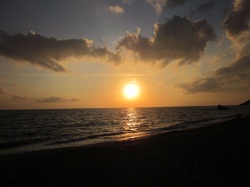 1. Sunset at Aphrodite’s Rock last Saturday 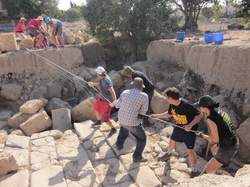 2. It’s not always the bipod – moving rocks to access the drain for soil samples 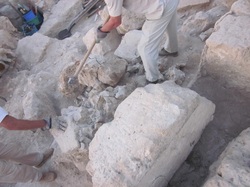 3. Breaking through the rock and plaster in Trench 11A 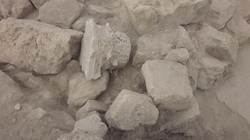 4. Architectural pieces in the rocky tumble of Trench 11A By Hugh Watt Sunny with a cooling breeze - another fine Cyprus day. It's also a "rest" day with time to visit other sites. We visited Kourion, some 60km distance from Paphos on the south coast. Kourion is one of the significant archaeological sites in Cyprus, strategically located overlooking the Mediterranean, originally settled by the Mycenaeans in the 13th century BC. Two outstanding features include the reconstructed theatre destroyed by an earthquake (as were many sites in Cyprus) during the fourth century AD. The theatre is now frequently used for cultural events. The House of the Gladiators, which was perhaps a training area, features a well-preserved and stunning floor mosaic depicting gladiators in conflict. Finished the day with good company enjoying a fine fish meal at a Paphos taverna. 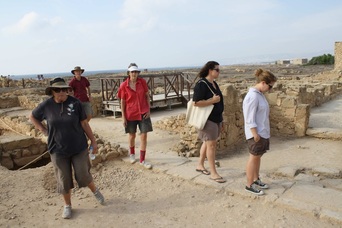 Team members exploring the mosaics at Paphos. 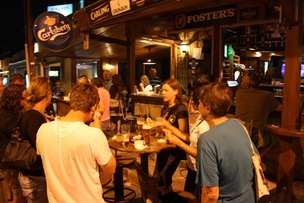 Enjoying watching Australia defeat South Africa in the Rugby World Cup at a local bar called Aces. See its not all hard work! Sophie and Danny at work in our registration "office" (ok, ok, registration corridor!). From here all material for publication is registered, identified with an inventory number and is tracked for its journey to the academic specialists writing about particular artefacts, and to the photography studio and drawing room for photography and illustration. The entire process for recording for the publication is run from these tables.
David White (archaeologist)
Its day 3 and trench 11A is ready to remove its large rubble from the Nymphaeum, a water feature employed by the ancients to supply both the aesthetic and physical needs of its populace. The method devised to remove this annoyance is a simple and elegant machine used by people for thousands of years which to the modern users is proving to be confusing and an anathema to all health and safety courses taken over the last few years. Day 4: The attempt to remove the annoyance has proved successful with no damage to the Nymphaeum and the Australian archaeological team, we still have much to remove but at least we have put a sizeable dent in what needs to be done. Secondary to the removal of the large stones from the Nymphaeum is a project to the south which was started today with the collection of soil from an ash layer which permeates much of the south eastern corner of the site. Soil collected in this instance is being used to test the hypothesis that the ash layer results from medieval industrial action once the theatre itself had fallen into a state of ruin and the site was used for semi domestic and industrial purposes. Very early preliminary testing of the ash layer has revealed a higher than average alkaline reading suggesting the high presence of calcium. An indication of high calcium at this stage lends credence to the possibility of a lime industry which fits neatly into the idea of the columns being removed from the theatre, broken down, crushed, burnt and utilised in secondary manufacture. This year being such short season see’s the Australian archaeological team targeting very specific goals and by the 4th day these goals look very much attainable in the current spirit of hard work and dedication to this fantastic site. A short video of the team reacquainting themselves with the site.
Some of you may remember Anthony's blog from last year about him developing a bipod, to enable us to safely move large stones and architectural tumble out of the way. Such is the case in our Trench 11A, positioned in the centre of the ancient nymphaeum. In order for us to access the mosaic on the bottom and to gain access to the theatre's architectural elements that had been dumped there, the bipod was employed again today. Hard work still, but easier (and of course safer) than lifting the stones......
Written and Produced by Rhian Jones
Back in Cyprus for my fourth year, it’s like I never left. The sun is still hot, the beer is still cold and the Apollo is still here…just! The team all arrived on Sunday, only to discover on Monday that the disused toilets in the storeroom have spent the last 12 months pumping water onto the floor. With no experience in underwater archaeology, we have to mop and salvage as best we can and leave everything to dry in the sun. Mind you, it doesn’t take long as it’s so hot! Started the two new trenches on Tuesday: 6x2m extension to the west of 10F, which Ronan Mc Eleney dug last year and I’m finishing off 10G, removing the last of the rocky fill from the Nymphaeum building. We’re only here for 3 weeks, so we have to be realistic about what we can get done. I’d love to finally expose all of the Nymphaeum’s mosaic floor…we’ve only been waiting 4 years to finish it off! As a supervisor this year, I like to motivate my team with helpful phrases like “dig harder”, “you’re doing it all wrong” and “I don’t care what the other trench is doing. If the other trench jumped off a cliff would you do it too?”. Only joking, everyone is hugely enthusiastic and working as a smooth, well-oiled machine in the trenches. It helps that the team is mostly people returning for their second, fourth or sixteenth years! But it’s nice to see new faces: different people bringing new jokes and new silly games to keep us laughing on site. As always, it’s great to meet so many specialists. Whether learning more about the pottery, the inventory system, the small finds or finally understanding just how to draw the inside profile of a pot, this dig has always been full of wonderful, talented people who are so generous with their time and knowledge. Thanks! So looking forward to three fabulous weeks of archaeology, amusement and Ace’s. See you all at the beach! A couple of images directly from the site of the first day of excavation. We are doing limited work in the area of the nymphaeum to the south of the ancient theatre, and extending a trench from last year south of the theatre too. Both are small scale projects as most team members will be working on find processing and recording soon! It's hot out there even at 7am!
|
BloggersEach season our team including the directors, students, architects, volunteers, ceramicists and other finds specialists will blog about the day to day sweat and adventures that come with life on an archaeological dig. Archives
May 2023
Categories
All
|
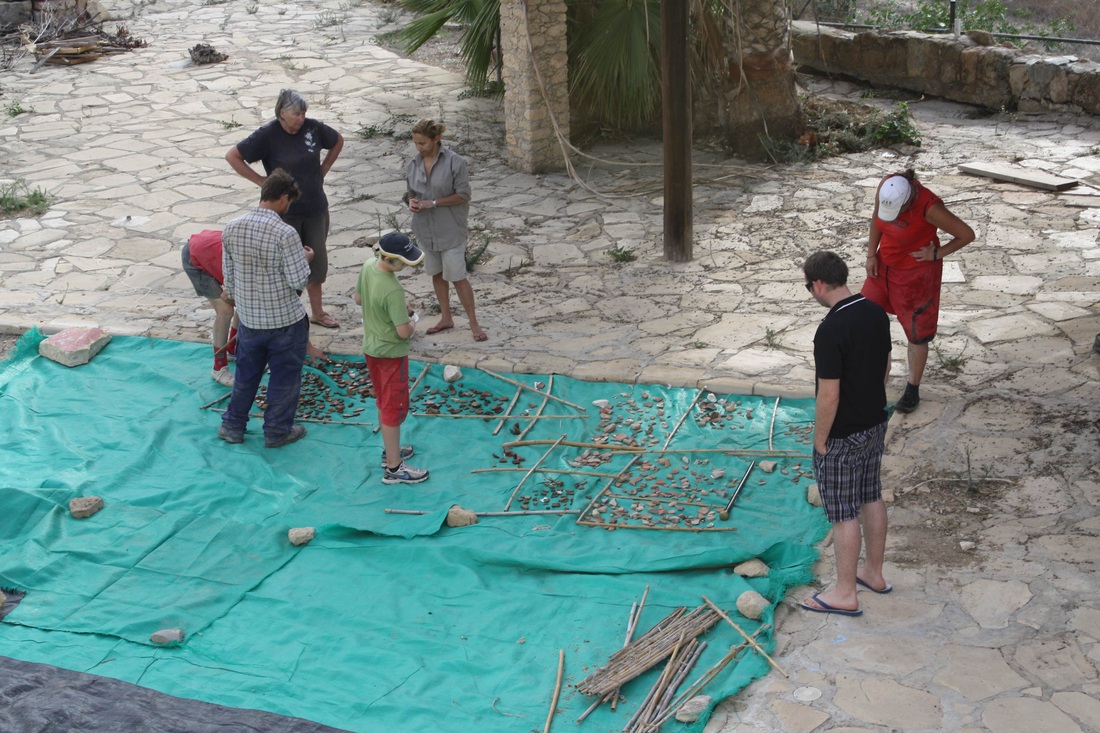
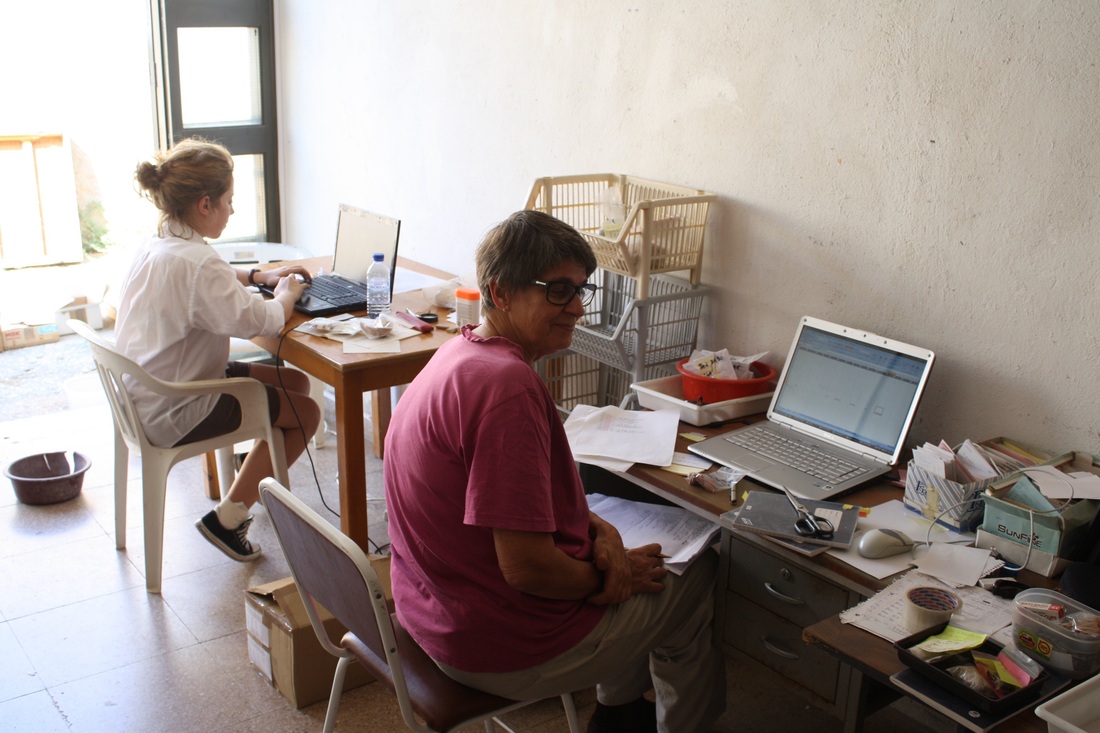
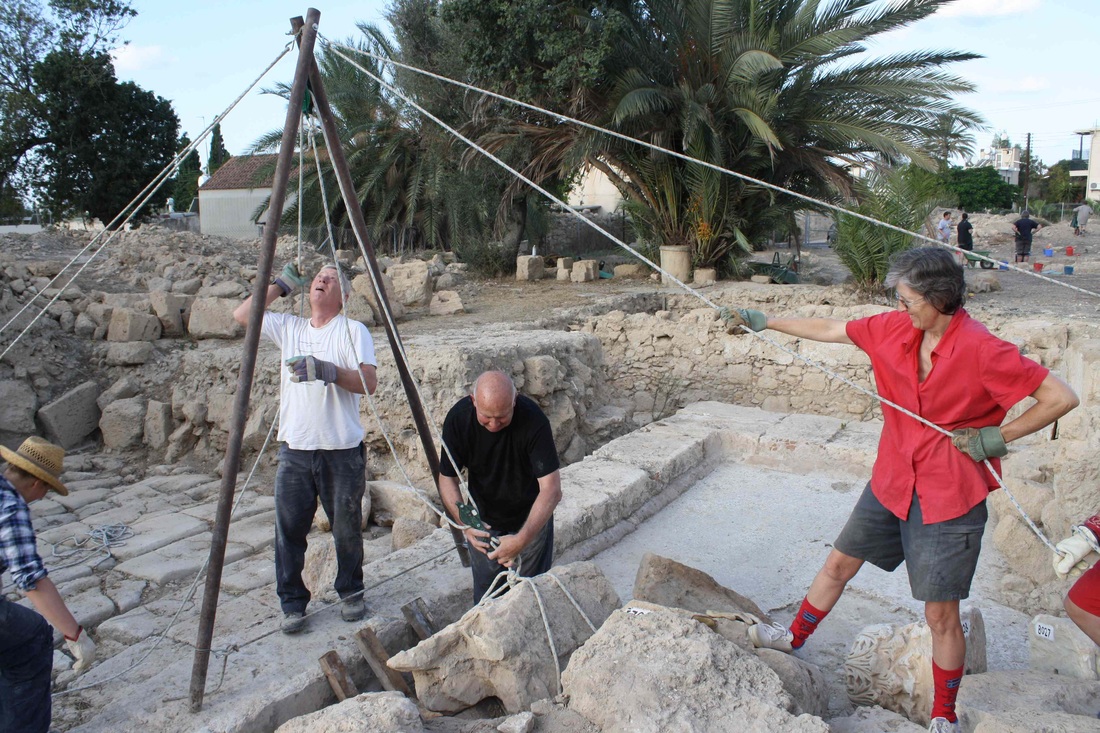
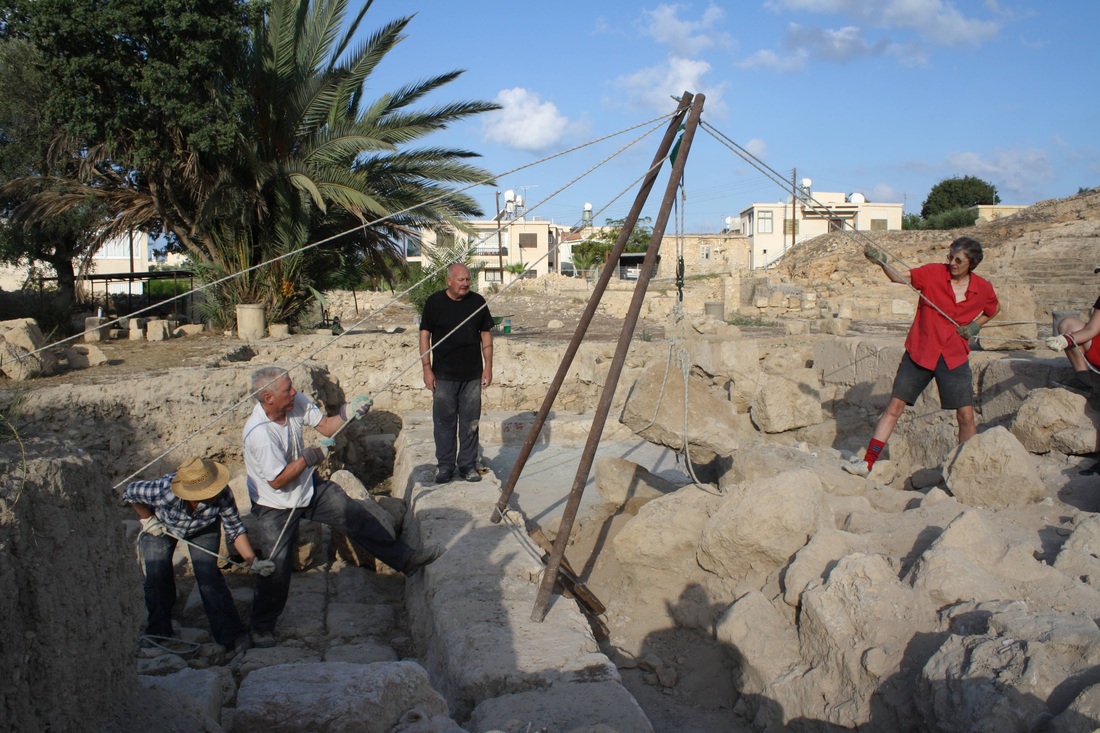
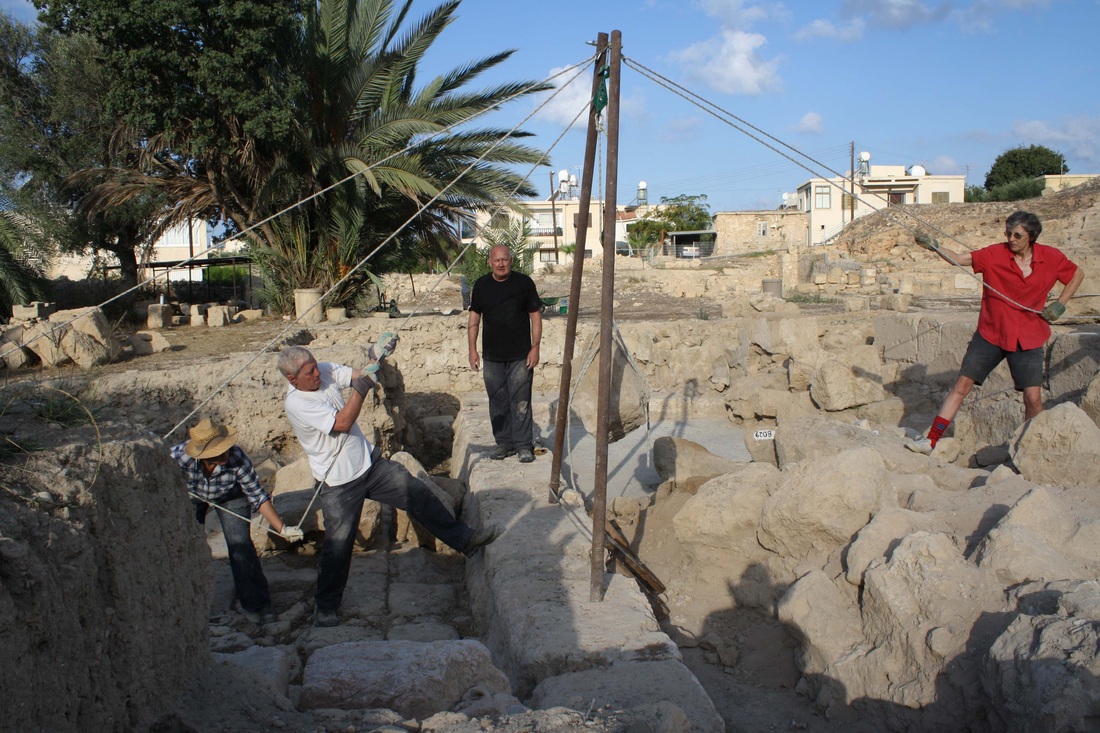
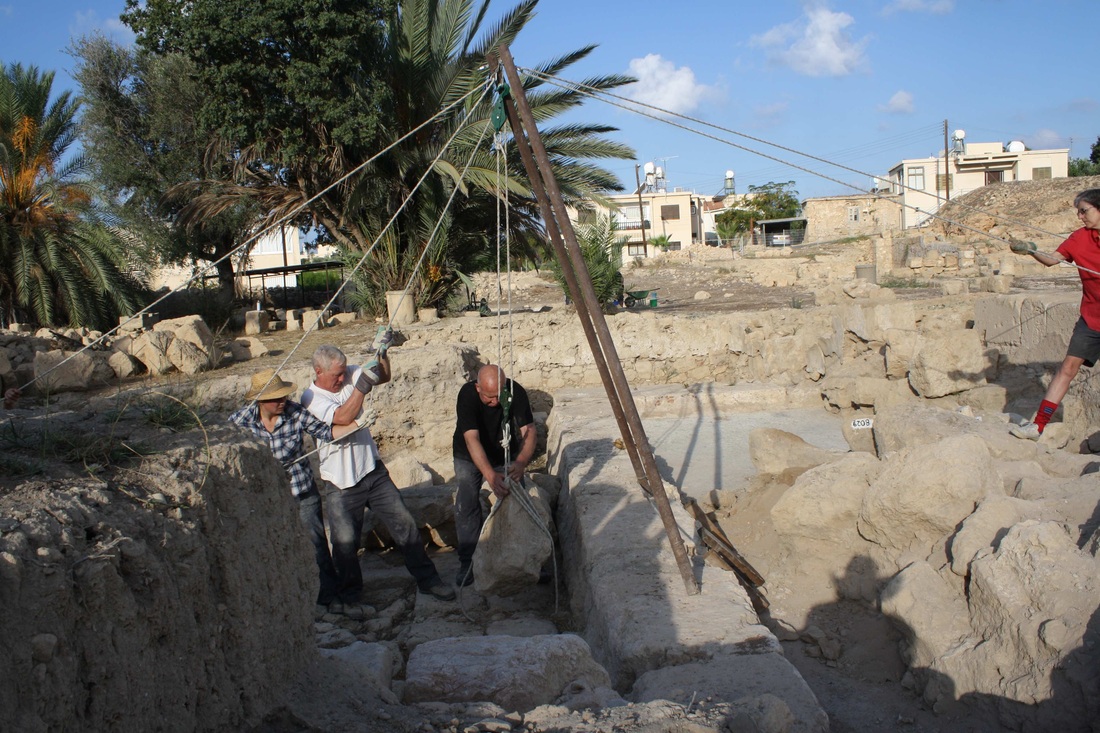
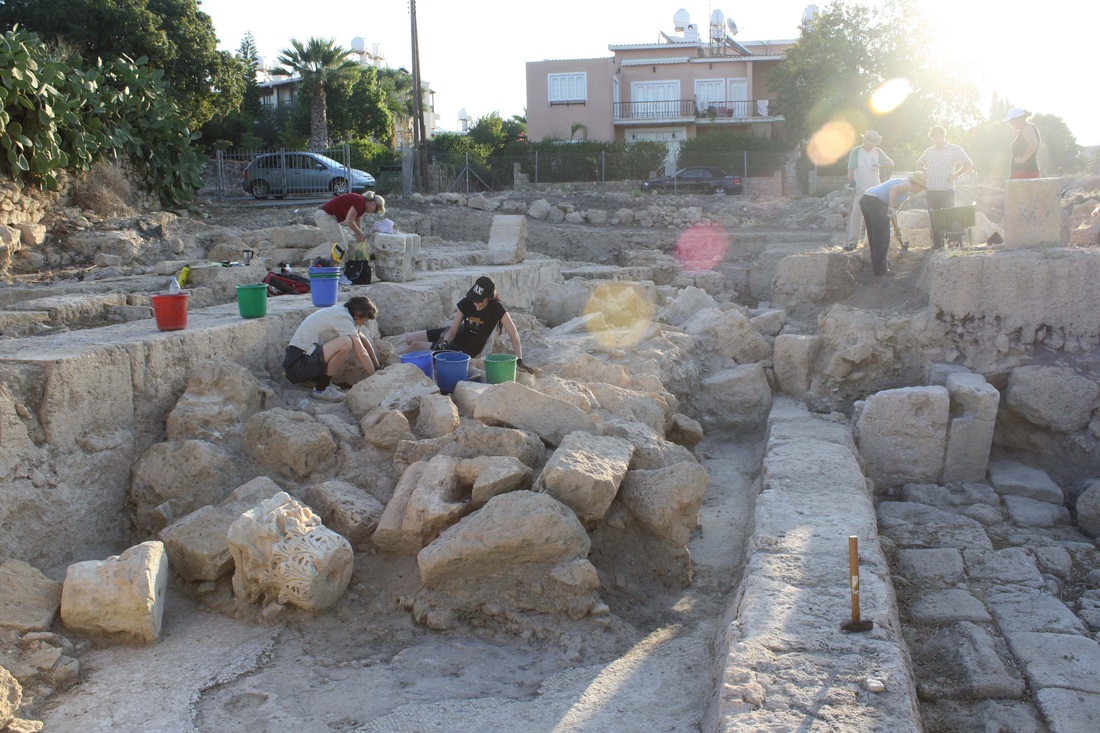
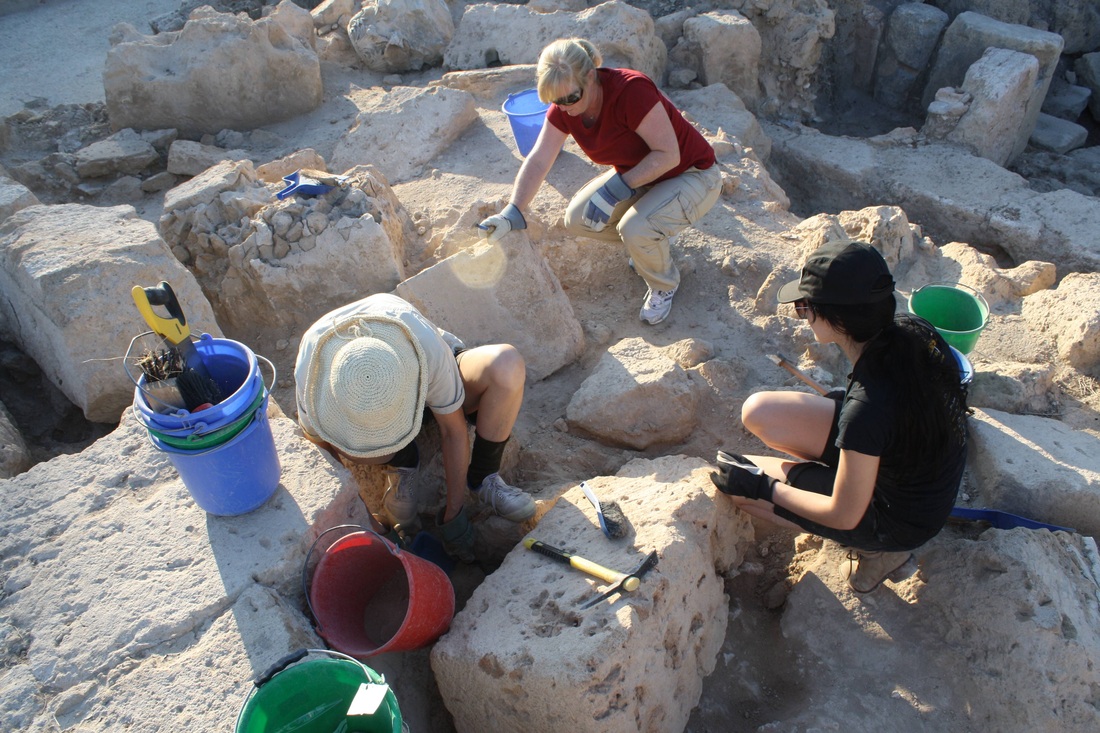
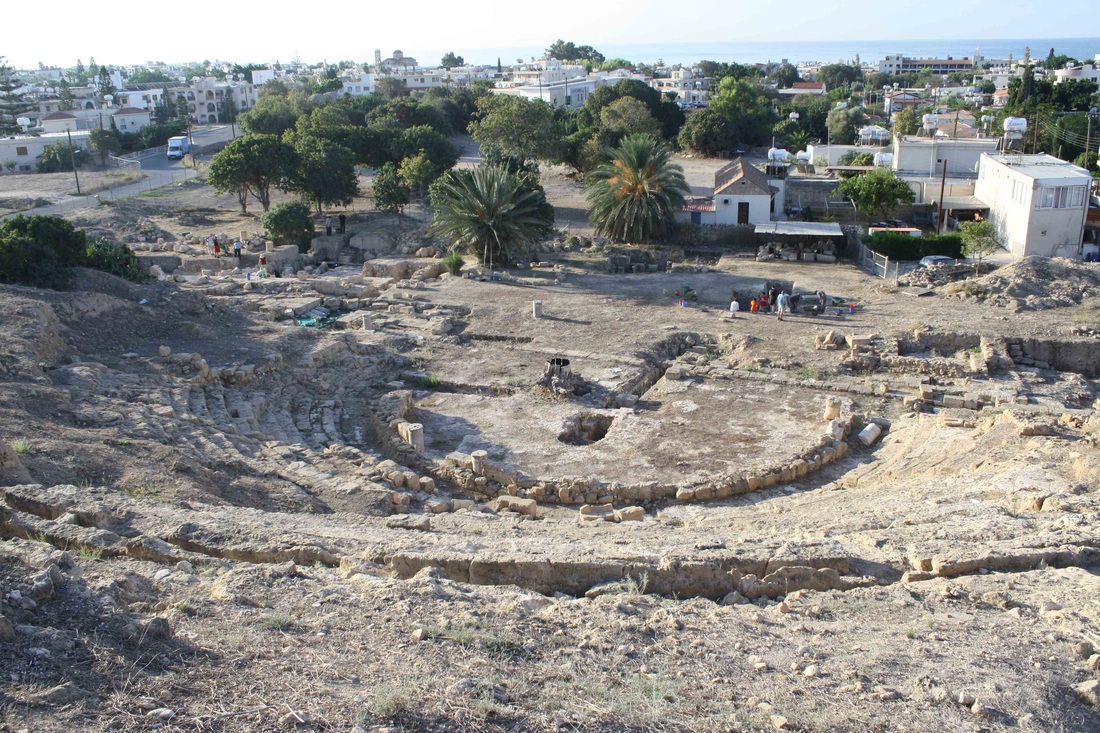
 RSS Feed
RSS Feed